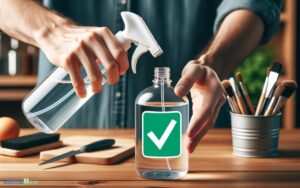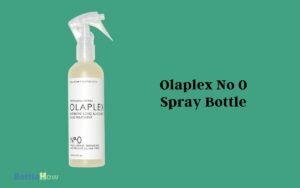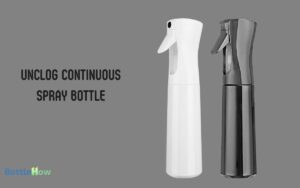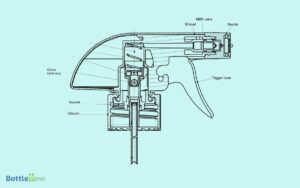Can You Put Murphy Oil Soap in a Spray Bottle? Yes!
Yes, you can put Murphy Oil Soap in a spray bottle to enhance your cleaning process. This method allows for even distribution, reduces waste, and increases efficiency.
To prepare the solution, mix the soap with water according to the recommended dilution ratios generally a quarter cup of Murphy Oil Soap to a gallon of water for standard cleaning tasks.
Transfer this diluted solution into a spray bottle and use it to easily target specific areas, ensuring thorough coverage without saturating the surfaces.
This approach is particularly effective on wood, tile, and laminate surfaces. Exploring further can uncover additional uses and techniques.
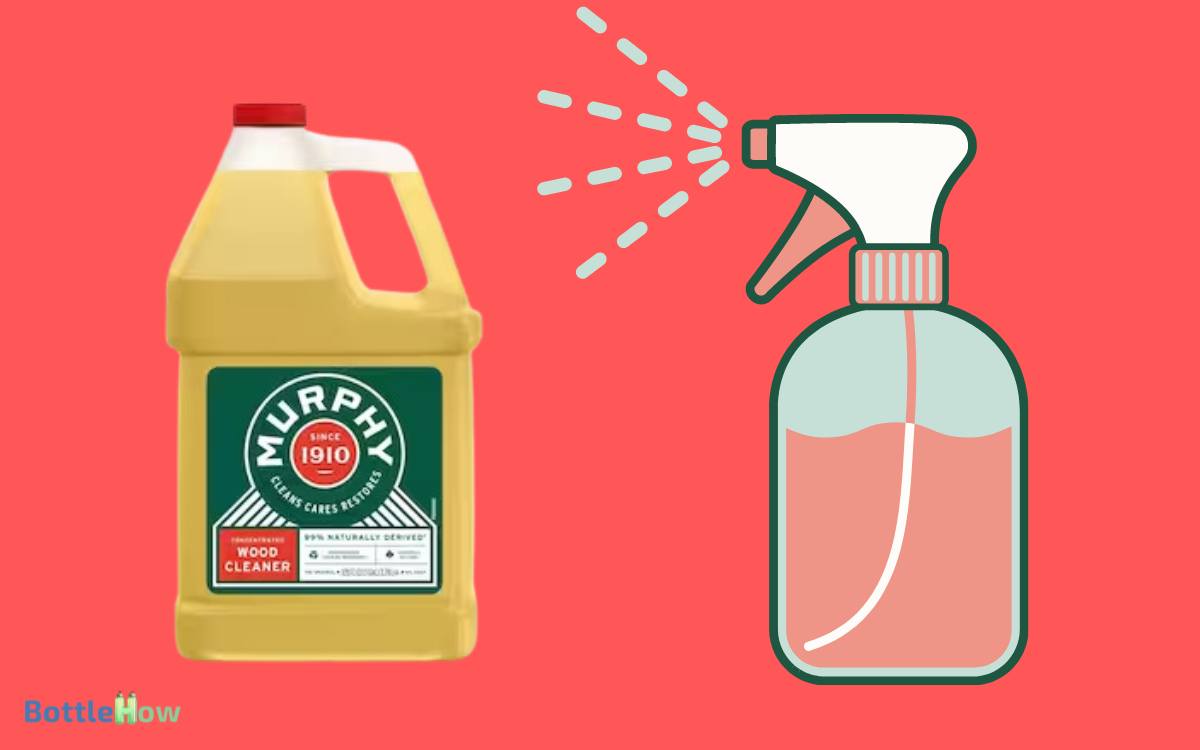
Key Takeaways
Understanding Murphy Oil Soap
Murphy Oil Soap, a trusted cleaner for wood surfaces, effectively lifts dirt and grime while preserving the finish. You’ll appreciate its gentle formulation, crafted primarily from natural elements, which guarantees it’s tough on stains but kind to your cherished wood items.
The soap’s versatility extends beyond wood, making it suitable for cleaning other surfaces without harsh chemicals. Its concentrated formula allows you to dilute it according to the cleaning task at hand, ensuring you use just the right amount to maintain efficacy without waste.
Using Murphy Oil Soap aligns with a commitment to caring for both your home environment and the broader ecosystem, thanks to its biodegradable properties. Remember, proper dilution is crucial for maximizing its benefits and efficiency.
Benefits of Spray Application
When you transfer Murphy Oil Soap into a spray bottle, you’ll notice a significant boost in cleaning efficiency. This method allows you to distribute the solution evenly and target specific areas easily, ensuring a thorough clean with less effort.
Additionally, it minimizes waste, as you can control the amount dispensed, avoiding overuse and spillage.
Enhanced Cleaning Efficiency
Using a spray bottle for your Murphy Oil Soap solution can greatly enhance your cleaning efficiency. This method allows you to apply the precise amount of cleaner directly where it’s needed, reducing waste and ensuring a thorough clean.
You’ll find that targeted application helps break down dirt and grime more effectively. By controlling the spray, you can avoid saturating surfaces, which is particularly beneficial for delicate materials that might be damaged by excessive moisture.
This efficient use of the product not only conserves the soap but also speeds up the cleaning process, allowing you to tackle more areas in less time.
Overall, this technique empowers you to maintain high cleaning standards, essential for anyone dedicated to serving and caring for others.
Convenient Application Method
Applying your cleaner with a spray bottle not only streamlines the process but also enhances precision and ease of use. By adopting this method, you’re able to target specific areas more efficiently, ensuring that your efforts are maximized where they’re most needed.
This approach suits anyone looking to maintain impeccable cleanliness with minimal effort. It’s particularly helpful in large spaces or areas that require frequent touch-ups.
You’ll find that using a spray bottle allows for quicker response to spills and stains, keeping your environment pristine and inviting.
This method empowers you to provide better care and maintenance for the spaces you cherish, ultimately improving the overall atmosphere for everyone who enters.
Reduced Product Waste
You’ll notice a significant reduction in product waste when you opt for spray application, as it disperses a controlled amount of cleaner precisely where needed.
This efficiency not only conserves the product but also guarantees you’re using just enough to get the job done without excess.
- Targeted Application: Spray bottles allow you to apply Murphy Oil Soap directly to the spots that need it most, avoiding overuse.
- Consistent Coverage: A fine mist provides even coverage, which enhances cleaning effectiveness and reduces the need for reapplication.
- Measured Usage: Most spray bottles can be adjusted to dispense various amounts, giving you ultimate control over the quantity used, fostering both economy and environmental stewardship.
Recommended Dilution Ratios
When using Murphy Oil Soap in a spray bottle, it’s important to adjust the dilution ratio according to the cleaning task at hand.
For regular upkeep, a standard cleaning solution works effectively by mixing a quarter cup of soap per gallon of water.
Here’s a table of recommended dilution ratios for Murphy Oil Soap when used in a spray bottle:
| Purpose | Dilution Ratio | Instructions |
|---|---|---|
| General Cleaning | 1:32 | Mix 1/4 cup of Murphy Oil Soap per gallon of water |
| Heavy Duty Cleaning | 1:16 | Mix 1/2 cup of Murphy Oil Soap per gallon of water |
| Spray Bottle Application | 1:64 | Mix 2 tablespoons of Murphy Oil Soap per quart of water |
| Wood Floor and Furniture | 1:32 | Mix 1/4 cup of Murphy Oil Soap per gallon of warm water |
| Tile and Linoleum Floors | 1:32 | Mix 1/4 cup of Murphy Oil Soap per gallon of water |
These ratios are typically meant to provide effective cleaning while ensuring the soap solution is not too concentrated, which might leave residues or damage surfaces.
Remember, it’s also good practice to test any cleaning solution in an inconspicuous area first to ensure it does not damage the finish or material.
Standard Cleaning Solution
To achieve the best cleaning results with Murphy Oil Soap, it’s crucial to mix it at the recommended dilution ratio of 1/4 cup of soap per gallon of warm water.
This standard solution is ideal for everyday cleaning and will help maintain the natural beauty of your surfaces without leaving residue.
Benefits of the standard dilution include:
- Economy: Using just a quarter cup per gallon guarantees you get the most out of your Murphy Oil Soap, making it a cost-effective cleaning solution.
- Efficiency: This ratio is perfect for general cleaning tasks, effectively removing dirt and grease without excessive scrubbing.
- Safety: Diluted properly, the solution is gentle on most surfaces, reducing the risk of damage.
Heavy Duty Mix
For tougher stains and grime, a heavier mix of Murphy Oil Soap, using 1/2 cup per gallon of water, effectively breaks down the most stubborn residues.
When you’re facing challenges like built-up grease or scuff marks that won’t budge with regular cleaning, this concentrated solution is your go-to.
It’s important to guarantee the mixture is well-diluted and shaken in your spray bottle to maintain its efficacy throughout your cleaning session.
Sensitive Surface Formula
If you’re cleaning particularly delicate surfaces, a milder mixture of 1/4 cup Murphy Oil Soap per gallon of water is recommended to prevent damage. This gentler solution is ideal for maintaining the integrity and appearance of sensitive materials without risking harm.
Here are some key considerations for using this sensitive surface formula:
- Wood Surfaces: Perfect for polished or antique wood, ensuring no harsh effects while leaving a clean finish.
- Painted Items: Safely cleans painted walls or furniture, protecting the paint’s vibrancy and longevity.
- Laminate and Tile: Effectively removes dirt without leaving residue or causing abrasions, preserving the surface’s sheen.
Always prioritize the care and preservation of delicate areas by choosing the right cleaning solution.
Preparing Your Spray Solution
Combining your Murphy Oil Soap solution accurately guarantees top performance and safety when transferred to a spray bottle. Start by diluting the soap in warm water.
Typically, you’ll need 1/4 cup of Murphy Oil Soap for every gallon of water. If you’re preparing a smaller batch, maintain the same ratio—this ensures the effectiveness and gentleness of the solution remains consistent.
Pour the diluted soap into a clean spray bottle using a funnel to avoid spills and waste. Make sure the spray bottle is thoroughly rinsed beforehand to prevent any cross-contamination with previously used chemicals.
Securely tighten the spray bottle‘s nozzle to prevent leaks and ensure a uniform spray pattern when applied. This preparation step is essential for achieving excellent results and maintaining the integrity of the surfaces you’re caring for.
Application Techniques
To effectively apply your diluted Murphy Oil Soap solution, start by setting your spray bottle to a fine mist setting. This guarantees a gentle, even coating, which is essential for achieving the best cleaning results without over-saturating surfaces.
Here are some techniques to enhance your application process:
- Target Surfaces: Focus on wood surfaces such as cabinets, tables, and chairs. Spray lightly and evenly.
- Wipe Technique: After spraying, use a soft, clean cloth to wipe the surface. This helps distribute the soap evenly and buffs the wood to a natural shine.
- Frequency of Use: Regular application can maintain the cleanliness and luster of your wood surfaces without causing buildup or damage.
Safety and Precautions
When using Murphy Oil Soap, make sure you wear appropriate protective gear such as gloves to prevent skin irritation.
Additionally, it’s important to work in a well-ventilated area to avoid inhaling any fumes that could be potentially harmful. Keep the product away from children and pets to guarantee their safety.
Here’s a quick reference table for handling Murphy Oil Soap safely:
| Safety Item | Purpose | Additional Tips |
|---|---|---|
| Gloves | Prevent skin irritation | Use nitrile or latex gloves |
| Ventilation | Minimize inhalation risks | Open windows/use an exhaust fan |
| Eye Protection | Avoid eye contact | Wear safety goggles |
| Proper Storage | Prevent accidental ingestion | Store in a secure, cool place |
| Clean Spill Immediately | Avoid slips and chemical damage | Use absorbent material, then rinse |
Always check the label for specific safety instructions tailored to the use of Murphy Oil Soap in various cleaning tasks.
Effectiveness on Different Surfaces
When you’re considering using Murphy Oil Soap in a spray bottle, it’s important to assess its effectiveness on various surfaces.
It excels in cleaning wood surfaces, ensuring a natural, polished look without damaging the wood’s integrity.
However, its performance on tile and laminate, as well as its suitability for upholstery and fabric, requires careful consideration to avoid potential harm.
Wood Surfaces Cleaning
Murphy Oil Soap effectively cleans various wood surfaces, ensuring they remain pristine and well-maintained. When you’re tasked with the upkeep of wood furnishings or floors, this cleaner is a trusted ally.
Here’s why it stands out:
- Gentle Formula: It’s gentle enough not to damage the wood’s finish, preserving the beauty and longevity of your surfaces.
- Deep Cleaning: It penetrates deeply to remove grime and buildup, restoring the wood’s natural luster without harsh chemicals.
- Versatile Use: Whether it’s hardwood floors, antique furniture, or modern cabinets, Murphy Oil Soap handles it all with ease, making your cleaning process both efficient and effective.
You’ll find this product indispensable in maintaining the aesthetic and functional quality of your wood surfaces.
Tile and Laminate Performance
While Murphy Oil Soap is highly effective on wood surfaces, it also offers excellent cleaning capabilities on tile and laminate floors. You’ll find it’s a superb choice for maintaining the pristine appearance of these surfaces.
Its gentle, yet effective, formulation removes dirt and grime without leaving any harmful residues. This makes it ideal for areas that require frequent cleaning, especially in homes or environments where cleanliness is paramount.
For best results on tile and laminate, dilute the soap according to the manufacturer’s instructions before application. This guarantees that you achieve a thorough clean without damaging the surface integrity.
Remember, the right dilution will help you serve others by maintaining a clean, welcoming environment.
Upholstery and Fabric Use
Shifting focus to upholstery and fabric, you’ll find that Murphy Oil Soap also excels in safely cleaning these materials without leaving any residue. Its gentle formula guarantees that even delicate fabrics aren’t harmed during the cleaning process.
Here’s how you can effectively use it:
- Dilution Is Key: Mix a small amount with water in a spray bottle for a light, even application.
- Spot Test: Always test on a small, inconspicuous area to confirm colorfastness and material compatibility.
- Soft Cloth Application: Use a soft, clean cloth to apply the solution, gently working on the stains or soiled areas.
This approach helps maintain the integrity and appearance of your upholstery, making it a reliable choice for your cleaning needs.
Cleaning Wood Furniture
To effectively clean wood furniture, you should use a gentle, diluted solution of Murphy Oil Soap in a spray bottle. Mix the solution according to the label’s directions to make sure it’s safe for use on your cherished items.
Lightly mist a soft, clean cloth with the solution rather than spraying directly onto the furniture, which prevents any excessive moisture from seeping into the wood. Wipe the surface gently to remove dirt and grime, following the grain to avoid scratching the wood.
For best results, don’t oversaturate the cloth; a light touch is often enough. After cleaning, buff the surface with a dry, soft cloth to restore its natural shine and protect the finish, preserving the beauty and integrity of your wood furniture.
Caring for Hardwood Floors
Just as you care for your wood furniture, maintaining your hardwood floors requires specific attention to preserve their beauty and longevity. It’s crucial to employ the right techniques and products to guarantee they stand the test of time.
Here are some key practices you should follow:
- Regular Cleaning: Sweep or vacuum regularly to remove dirt and grit that can scratch the wood’s surface.
- Appropriate Mopping: Use a damp mop with a mild soap solution, like diluted Murphy Oil Soap, to clean without damaging the finish.
- Avoid Excess Water: Always wring out mops thoroughly, as standing water can warp and damage wood floors.
Additional Uses and Tips
Beyond cleaning hardwood floors, Murphy Oil Soap has versatile applications around your home, offering effective solutions for various cleaning challenges.
You can use it to clean your leather furniture; it’s gentle enough not to damage the material while removing dirt effectively.
For your kitchen, it works wonders on greasy cabinets and backsplashes. Dilute it in a spray bottle for quick application and wipe down with a soft cloth.
It’s also useful for cleaning outdoor furniture. The soap won’t harm garden plants, making it ideal for patio or deck areas.
Always remember to dilute the soap as concentrated solutions may be too harsh for some surfaces, ensuring you’re providing the best care without damage.
Troubleshooting Common Issues
While Murphy Oil Soap is effective for various cleaning tasks, it’s important to address common issues you might encounter to maintain its efficacy.
Here are a few troubleshooting tips:
- Clogging: If the spray nozzle becomes clogged, rinse it under hot water. If persistent, soak in a solution of vinegar and water to dissolve the residue.
- Streaking: If you’re noticing streaks, you’re likely using too much soap. Dilute the solution further with water for better results.
- Residue Build-Up: If residue builds up on surfaces, switch to a microfiber cloth for application, ensuring you buff the surface thoroughly to enhance shine and prevent buildup.
Conclusion
In the dance of cleaning, Murphy Oil Soap and a spray bottle are partners in grace. As you mist over surfaces, each spray disperses not just a solution but a promise of renewal. Your cherished wood gleams, your floors whisper thanks.
Embrace the power of precise dilution and targeted application—this isn’t just maintenance, it’s an act of care. So, wield your spray bottle confidently, knowing each spray nurtures and transforms, safeguarding your home’s beauty and longevity.

